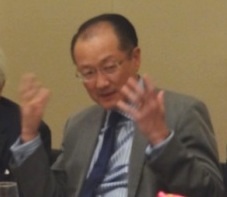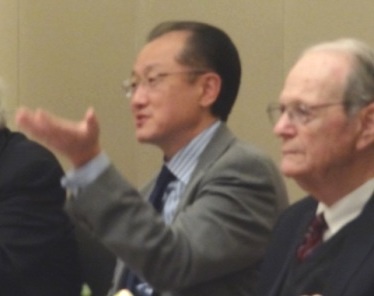On November 16, the Bretton Woods Committee brought together seventeen members with extensive, high-level experience at the World Bank for an intimate lunch with new Bank President Jim Yong Kim, co-hosted by Committee chairs Jim Wolfensohn and Bill Frenzel.

To meet this challenge, President Kim spoke during the lunch about what he sees as keys to aggressively fight poverty: a dynamic private sector, greater gender equity, progress on climate change, and an emphasis on shared prosperity.
Members had the opportunity to question President Kim about how he would like to adapt the Bank's financing models, governance structures, and the growing "knowledge agenda" to achieve these goals. He highlighted the Bank's comparative advantages in putting policy advice and research into practice on the ground, while noting the need to continue to improve the Bank's implementation and delivery strategies, as well as the ways in which it captures and assesses data. He also stressed the Bank's "unique value proposition" of combining government-level knowledge, high quality independent research, topical expertise, access to financing, and a good rate of investment return.
Building on successes at the International Finance Corporation, President Kim related his hopes to expand results-oriented systems throughout the World Bank Group - a focus on "outcomes instead of outputs" as one Bretton Woods Committee member observed. President Kim provided examples of how he could see this new approach changing the way the Bank measured progress, such as comparing the number of miles of new roads built to the amount of market access created by an infrastructure project. He called the Bank "a well of possibilities" for all of its member states and affirmed his goal to fight poverty wherever the Bank could.
Following the discussion, both Committee members and World Bank staff noted how this useful luncheon opened a dialogue between the Committee and the Bank on key issues shaping the future of the institution.

